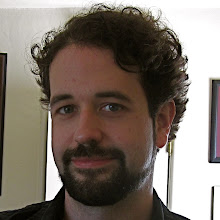Reading this chapter has me excited to look at the science of learning in greater detail.I've realized over the course of this year that not everybody learns like I do, and that even the things that "worked" for me were not necessarily the best ways for me to learn.
I enjoyed the side discussion about "Fish is Fish", in which a fish is told about the terrestrial world by a frog and interprets everything the frog says through the filter of what the fish already knows. This is an aspect of learning and thinking that I think everybody needs to be made aware of; many of the difficulties and conflicts that come up between people (and communities, and nations) can be traced back to this sort of blindness to our own paradigms.
The book is absolutely right when it says that you have to address a student's mental framework (paradigm) in order to get them engaged in learning. There are two especially tricky things about dealing with flawed paradigms, though:
1.) People are generally oblivious to the fact that they have paradigms. A person's conceptual framework is so ingrained into how they see the world that they have no sense of how it limits them. Asking a person to be aware of his/her paradigms is like asking a fish to be aware of water.
2.) When you do confront people with the flaws in their paradigms, they often get really defensive about them. People don't want to discard their pre-established ways of looking at the world. It's threatening and uncomfortable, and it makes them feel stupid. People will often ride a flawed paradigm down into utter disaster, long after it becomes evident to everyone else that the framework is flawed (c.f. Operation Iraqi Freedom; Vietnam War; fiscal policy under Herbert Hoover; collectivist farms in Stalinist Russia; Roman Catholic Church re: geocentric model of the universe; et cetera, ad nauseum).
Since I'm going to be teaching physics in the spring, I have a big challenge ahead of me with confronting student paradigms. Somehow I need to address the many, many misconceptions they will have about how physics works, without making them feel threatened or attacked in the process.
It's going to be an interesting semester...
Wednesday, December 10, 2008
Wednesday, December 3, 2008
Pre-assessment, "How People Learn"
"Creativity is a central source of meaning in our lives...most of the things that are interesting, important, and human are the results of creativity...[and] when we are involved in it, we feel that we are living more fully than during the rest of life."When and where in your life have you experienced learning experiences or activities like this, where you were so absorbed in what you were doing, you needed no extrinsic motivation to continue? When do you feel the most alive and interested in what you are doing?
“… flow – the state in which people are so involved in an activity that nothing else seems to matter; the experience itself is so enjoyable that people will do it even at great cost, for the sheer sake of doing it.”
- Mihaly Csikszentmihalyi
I've always been driven by activities that engage my imagination, my sense of wonder, or both:
When I was a child I would play with my brother and my cousin with our stuffed animals, crafting elaborate stories of adventure and epic battles between good and evil. I have spent much of my time in the ensuing years as a storyteller; even now, I devote a large amount of my free time to creating a biweekly podcast for my fiction. It makes no money for me, but it is one of the most rewarding things I've ever done. I enjoy acting and cooking, both of which give me chances to create something new and interesting out of "raw" components. And I enjoy playing guitar, which gives me a chance to use my hands to make something beautiful.
My sense of wonder has always been well-developed. I remember going to aquariums and staring for hours at those creatures from another world; when we went to EPCOT Center, I was so entranced by "The Living Seas" that I didn't want to leave. Planetariums and the Johnson Space Center in Houston, TX evoked a similar feeling of awe. As I got older, I felt the same way about visiting museums, watching plays, walking through redwood forests, and reading novels, especially science fiction and fantasy. If someone can give me a glimpse of another world and populate it with interesting people (with interesting problems), I get sucked in really easily. I don't get to read as often as I would like, but there are some authors who I make appointments for: Jim Butcher, Kim Harrison, J. K. Rowling, Orson Scott Card, George R. R. Martin. When one of their books comes out, I drop everything else and devour it, sinking myself back into the world of those characters I've come to love so much.
Those are the two big requirements for "flow" for me: the chance to be creative, or the chance to encounter something new, awesome (in the older sense of the word), or wondrous.
Subscribe to:
Comments (Atom)
